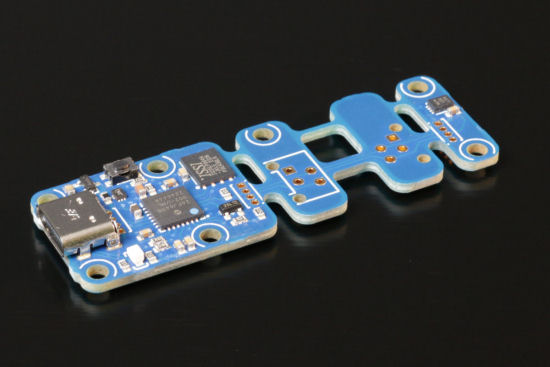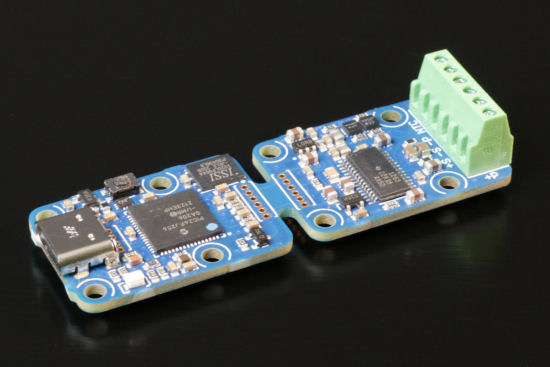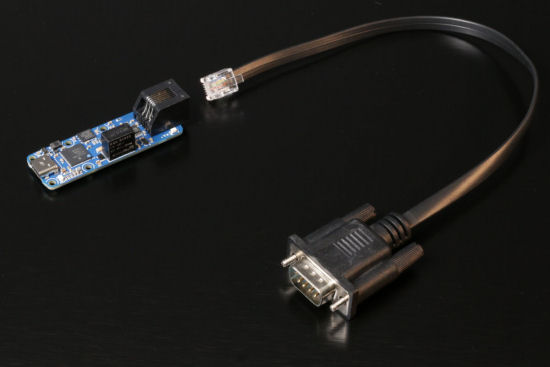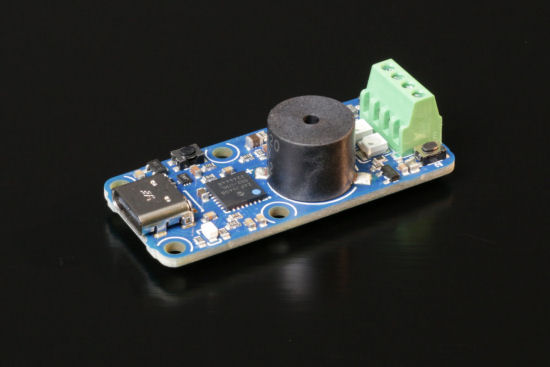![]() The saga of the new USB-C modules continues. This week, Yoctopuce brings you four modules freshly converted to USB-C connectivity: the Yocto-Temperature-C, the Yocto-Bridge-C, the Yocto-RS232-C, and the Yocto-Buzzer-C. Let's take a closer look...
The saga of the new USB-C modules continues. This week, Yoctopuce brings you four modules freshly converted to USB-C connectivity: the Yocto-Temperature-C, the Yocto-Bridge-C, the Yocto-RS232-C, and the Yocto-Buzzer-C. Let's take a closer look...
The Yocto-Temperature-C
The Yocto-Temperature-C is a simple temperature sensor. It informs you of the ambient temperature in the unit of your choice. Compared with other Yoctopuce temperature sensors, its quarter-degree accuracy isn't extraordinary, but this module covers the most basic needs while remaining affordable. Like all Yoctopuce sensors, the Yocto-Temperature-C features a data logger.

The Yocto-Temperature-C
The module is designed to be easily cut into two pieces, allowing you to move the sensor part by a few meters if required.
At CHF 28.30, the Yocto-Temperature-C is only 60 centimes more expensive than the micro-B version.
The Yocto-Bridge-C
The Yocto-Bridge-C is a module designed to interface Wheatstone bridges. The most common application is in the construction of scales. Indeed, the load cells used in all scales are Wheatstone bridges. The main characteristics of the Yocto-Bridge-C is its 0.01% accuracy, achieved thanks to a high-end analog converter: the ADS1263 from Texas instrument. The Yocto-Bridge-C also offers a number of useful features, such as automatic taring, also known as "zero tracking", temperature compensation, and bridge excitation in DC or AC.

The Yocto-Bridge-C
This module can also be cut into two pieces. This means you can place the USB part wherever you like, and install the measuring part as close as possible to the load cell to keep the wires leading to the cell as short as possible and thus limit the risk of interference.
As with the Yocto-Bridge, we decided to not strictly apply the "component price times three" rule when deciding on the price of the Yocto-Bridge-C. Had we applied the usual rule, the exorbitant price of the ADS1263 would have led to an excessive margin. The Yocto-Bridge-C is therefore priced at CHF 113.50, 50 centimes higher than the Micro-B version.
The Yocto-RS232-C
The Yocto-RS232-C lets you interface a device equipped with an RS-232 input/output. At first glance, you might think it's just another USB-to-serial adapter. But this module is much more subtle: it communicates directly with the Yoctopuce API without passing through a virtual COM port, which is a huge advantage if you need to interface several identical devices. The Yocto-RS232-C also features a small on-board system of user-programmable scripts that allow direct interrogation of the interfaced device and presentation of results in the manner of Yoctopuce sensors. In other words, if you've got a big, expensive measuring device with an RS232 output, you can use a Yocto-RS232-C to retrieve its measures just as easily as with a standard Yoctopuce sensor.

The Yocto-RS232-C
Finally, the Yocto-RS232-C is isolated: the RS232 part is electrically isolated from the USB part. This is particularly useful, if not essential, if your computer and the device you wish to interface are not connected to the same mains phase.
Once the calculations are done, the Yocto-RS232-C comes out at CHF 66.50, a price very similar to that of the micro-B version.
The Yocto-Buzzer-C
The Yocto-Buzzer-C is a small module with a buzzer, two LEDs, and two inputs for buttons. In short, just enough to provide a minimal user interface for a small project. The "Buzzer" function can, of course, beep at variable frequencies, but it can also play little melodies.

The Yocto-Buzzer-C
When we computed the price of the Yocto-Buzzer-C, we got a surprise. At CHF 32.50, it's four francs more expensive than the Micro-B version. In fact, it's the Micro-B version that's sold for less than it should be. We did a bit of investigating and, a few years ago, we replaced the loudspeaker of the Yocto-Buzzer with a model that was easier to source yet cheaper, and we adjusted the price of the Yocto-Buzzer accordingly. But it turned out that the new component wasn't entirely satisfactory, so we put the original one back in, but we didn't change the price in the other direction. This explains why.
In conclusion
The collection of Yoctopuce modules in USB-C format is beginning to expand in earnest, but strangely enough, we're still selling very few USB-C products, with Micro-B connectivity still accounting for the vast majority of the orders placed by our customers. We wonder why. Is it due to the price difference, often minimal, between Micro-B and USB-C versions? Is the popularity of USB-C exaggerated? Do customers just order the first version they see on our shop? Hasn't enough been said about the existence of these USB-C versions? If you have a theory, just feel free to share it in the comments below.


